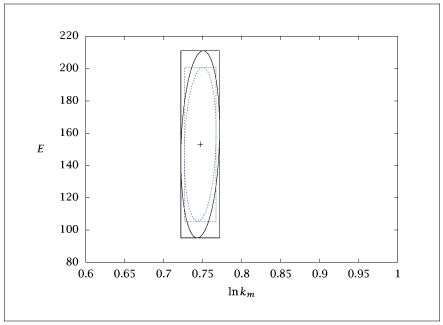1
2
3
4
5
6
7
8
9
10
11
12
13
14
15
16
17
18
19
20
21
22
23
24
25
26
27
28
29
30
31
32
33
34
35
36
37
38
39
40
41
42
43
44
45
46
47
48
49
50
51
52
53
54
55
56
57
58
59
60
61
62
63
64
65
66
67
68
69
70
71
72
73
74
75
76
77
78
79
80
81
82
83
84
85
86
87
88
89
90
91
92
93
94
95
96
97
98
99
100
101
102
103
104
105
106
107
108
109 | % Copyright (C) 2001, James B. Rawlings and John G. Ekerdt
%
% This program is free software; you can redistribute it and/or
% modify it under the terms of the GNU General Public License as
% published by the Free Software Foundation; either version 2, or (at
% your option) any later version.
%
% This program is distributed in the hope that it will be useful, but
% WITHOUT ANY WARRANTY; without even the implied warranty of
% MERCHANTABILITY or FITNESS FOR A PARTICULAR PURPOSE. See the GNU
% General Public License for more details.
%
% You should have received a copy of the GNU General Public License
% along with this program; see the file COPYING. If not, write to
% the Free Software Foundation, 59 Temple Place - Suite 330, Boston,
% MA 02111-1307, USA.
%
% arhenius.m
%
p = 2;
ndata = 10;
chisq = 5.99; % chi square value for 95% confidence level with 2 parameters
Fstat = 4.46; % F statistic for 95 % confidence level with 2 parameters and
% 10 data points (or 10-2=8 degrees of freedcom)
lnk0 = 1;
E = 100;
Tmin = 300;
Tmax = 500;
Tmeas = linspace(Tmin,Tmax,ndata)';
X = [ones(ndata,1) -1./Tmeas];
lnk = X*[lnk0; E];
k = exp(lnk);
measvar= 1e-3;
measstddev = sqrt(measvar);
%
% set seed for 'reproducible' random numbers
%
randn('seed',0);
%
%just a few noisy points
%
nexpts = 1;
clear lnkmeas;
for i = 1:nexpts
lnkmeas(:,i) = lnk + measstddev*randn(ndata,1);
end
%
%center the data first
%
Tcenter = -1./Tmeas + 1/mean(Tmeas);
Xcenter = [ones(ndata,1) Tcenter];
thetacenter = inv(Xcenter'*Xcenter)*Xcenter' * lnkmeas;
thetacentertr = thetacenter';
residual = lnkmeas-Xcenter*thetacenter;
samplevar = residual'*residual/(ndata-p);
npts = 181;
amat = Xcenter'*Xcenter;
level = chisq*measvar;
[x, y, major, minor, bbox] = ellipse (amat, level, npts);
%
% shift the ellipse's center to the estimated parameters
%
lnkest = thetacenter(1);
Eest = thetacenter(2);
x = x+lnkest;
y = y+Eest;
minor(:,1) = minor(:,1) + lnkest;
minor(:,2) = minor(:,2) + Eest;
major(:,1) = major(:,1) + lnkest;
major(:,2) = major(:,2) + Eest;
bbox(:,1) = bbox(:,1) + lnkest;
bbox(:,2) = bbox(:,2) + Eest;
bbox1 = bbox;
outline1 = [x, y];
level = Fstat*p*samplevar;
[x, y, major, minor, bbox] = ellipse (amat, level, npts);
%
% shift the ellipse's center to the estimated parameters
%
x = x+lnkest;
y = y+Eest;
minor(:,1) = minor(:,1) + lnkest;
minor(:,2) = minor(:,2) + Eest;
major(:,1) = major(:,1) + lnkest;
major(:,2) = major(:,2) + Eest;
bbox(:,1) = bbox(:,1) + lnkest;
bbox(:,2) = bbox(:,2) + Eest;
bbox2 = bbox;
outline2 = [x, y];
save parestellipse.dat thetacentertr bbox1 outline1 bbox2 outline2;
if (~ strcmp (getenv ('OMIT_PLOTS'), 'true')) % PLOTTING
plot (thetacentertr(:,1), thetacentertr(:,2), '+', ...
bbox1(:,1), bbox1(:,2), outline1(:,1), outline1(:,2), ...
bbox2(:,1), bbox2(:,2), '--', outline2(:,1), outline2(:,2), '--');
axis ([0.6, 1.0, 80, 220]);
% TITLE
end % PLOTTING
|
